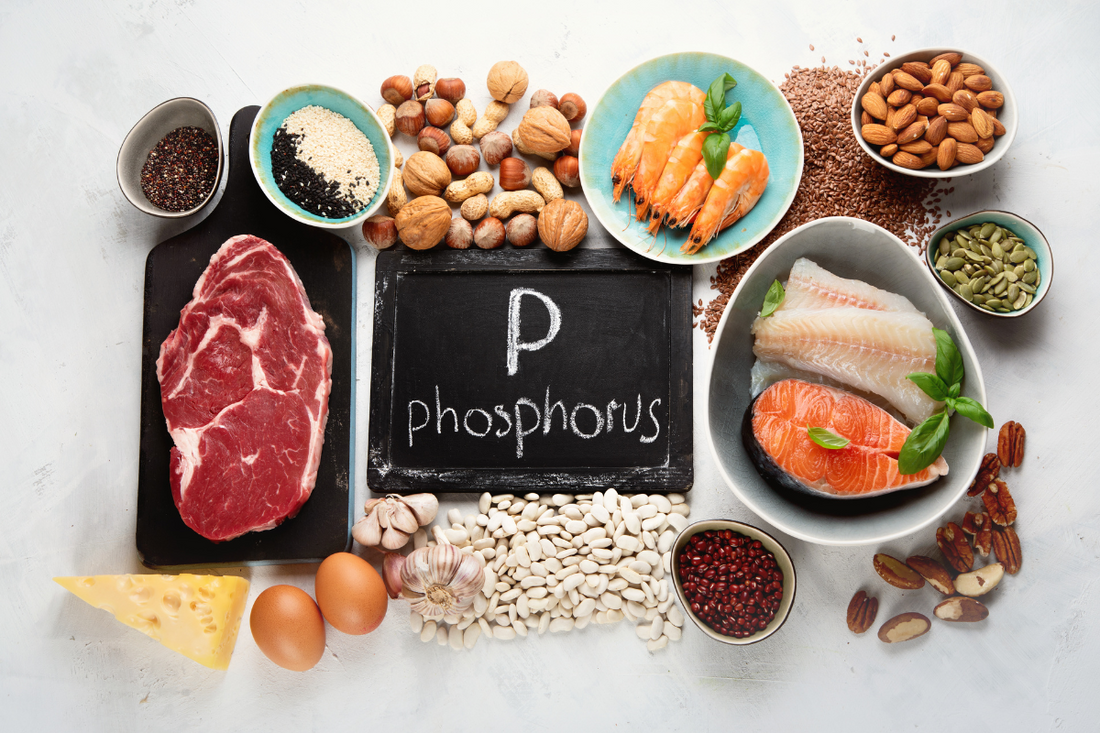Have you wondered why our bodies need phosphorus? Phosphorus, the second most prevalent mineral in the body, is essential to many physical functions but sometimes overshadowed by calcium and magnesium. To promote bone health and cell function, phosphorus should be at the forefront of dietary talks.
In this blog, we will discuss the uses, benefits, how much we need, indicators of lack, and how to get enough about phosphorus.
The Importance of Phosphorus
Our cells contain 1% of our body weight in phosphorus, an important mineral. Energy production, bone and tooth strength, and cellular and muscular function depend on it. Its main function is producing ATP, which powers most cellular operations. Phosphorus works with calcium and magnesium to strengthen bones and muscles. Phosphorus is found in many foods, making it easy to get in a balanced diet, but deficiency can cause health problems.
Phosphorus: 5 Essential Functions and Benefits
Bone and Teeth Health
Calcium and phosphorus develop and maintain strong bones and teeth. They form a mineral matrix that strengthens the skeleton. The body has 85% of its phosphorus in bones and teeth. To maintain bone density when calcium levels fluctuate, the body might use phosphorus. This makes phosphorus crucial for preventing osteoporosis and other bone disorders.
Energy Generation and Storage
One of phosphorus' main functions is energy production. ATP, the body's energy currency, contains phosphorus. Whenever we consume, phosphorus converts carbs, lipids, and proteins into ATP, which drives cells, muscles, and mental awareness. Without enough phosphorus, energy synthesis fails, causing weariness and cellular dysfunction.
Cell and Muscle Function
Cell membranes and DNA contain phosphorus, which is essential for cell structure and reproduction. Phospholipids, phosphorus-containing fat molecules, keep cell membranes flexible and functional. Phosphorus also helps cardiac muscles contract smoothly. Lack of phosphorus can cause muscle weakness, cramping, and irregular heartbeats.
pH Balance
Homeostasis requires the body to manage its acid-base balance, keeping blood pH within a restricted range. Phosphorus and potassium buffer acids in the body, preventing tissue and organ damage. Phosphorus neutralizes acids, supporting cellular function and reducing acid-related chronic illnesses.
Brain and Nerve Transmission
DNA and RNA contain phosphorus, which is essential for brain and nerve activity. It creates and repairs cells, promoting brain function and cognition. This mineral helps the neurological system send signals, allowing the brain to connect with the body.
Men and Women Need Phosphorus Daily requirement
The RDA for phosphorus varies by age, gender, and physiological situations like pregnancy or lactation. Generally:
- Men and women: 700 mg daily
- Maternal Women: Need 700–1000 mg each day.
Most people can get their daily phosphorus needs from the diet, but those with medical disorders that hinder absorption or who eat a restrictive diet low in phosphorus-rich foods may need a supplement.
Phosphorus-Deficiency Symptoms:
Phosphorus deficiency might have subtle signs yet gradually worsen health. Low-phosphorus people may:
- Painful bones and joints: As the body uses bone stores for cellular activity, bones may deteriorate, creating discomfort and fracture risk.
- Weak muscles and fatigue: Without enough phosphorus, ATP generation decreases, causing fatigue, energy loss, and muscle cramps.
- Weak appetite: Appetite loss from phosphorus shortage makes meeting dietary demands tougher.
- Breathing Problems: Extreme phosphorus shortage can weaken respiratory muscles, making breathing difficult.
- Weak Immune System: Phosphorus deficiency may weaken the immune system, making people more prone to diseases.
What are The High-Phosphorus Diet?
A balanced diet makes getting adequate phosphorus easy, but let's look at some high-phosphorus foods and how to combine them:
Milk, cheese, yoghurt
Milk, cheese, and yogurt are calcium and phosphorus-rich. Milk has the right combination of phosphorus and calcium, which strengthen bones and teeth. A cup of milk contains 250 mg of phosphorus, while a serving of cheese contains 200–300 mg, depending on the variety. Have a bowl of yoghurt with nuts and fruits for breakfast or a glass of milk for a snack.
Eggs: High in Phosphorus
Eggs supply 100 mg of phosphorus and are one of the most adaptable foods. Along with phosphorus, eggs include high-quality protein, healthy fats, and vitamins. Eggs are a great way to increase phosphorus intake because they're readily available and easy to cook. Scrambled or poached eggs offer a healthy breakfast, while hard-boiled eggs are pocket snacks. For extra phosphorus, add eggs to salads, sandwiches, or whole-grain foods like brown rice or quinoa.
Lean Meats, Poultry
Chicken, turkey, and lean beef are high-protein, phosphorus-rich foods. Typical 3-ounce chicken breast provides 200 milligrams of phosphorus. These meats provide nutrients for muscle maintenance and general health, making them perfect for athletes and those who require more protein and phosphorus. Try grilling, baking, or sautéing lean meats with veggies and healthy grains for a phosphorus-rich supper.
Almonds, Pumpkin Seeds, Sunflower Seeds
Nuts and seeds are rich in phosphorus and magnesium, making them good for mineral intake and health. Pumpkin seeds have nearly 300 mg of phosphorus per ounce, while almonds have 140 mg. Nuts and seeds are calorie-dense, yet a little handful daily can boost phosphorus consumption.
Oats, Brown Rice, Quinoa
Fiber, B vitamins, and modest phosphorus are in whole grains. Quinoa has 280 mg of phosphorus per cup, while cooked oats have 180 mg. These grains boost energy and digestion. Eat a savoury quinoa salad for lunch or porridge with nuts, seeds, and fruit for phosphorus in the morning.
Phosphorus Supplements
Phosphorus supplements can help people who cannot get enough phosphorus from food owing to dietary limitations or medical issues. However, high phosphorus intake can disturb the mineral balance, especially calcium, thus supplements should only be taken under medical supervision. Phosphorus supplements are advised for inadequacies, kidney problems, and absorption abnormalities.


